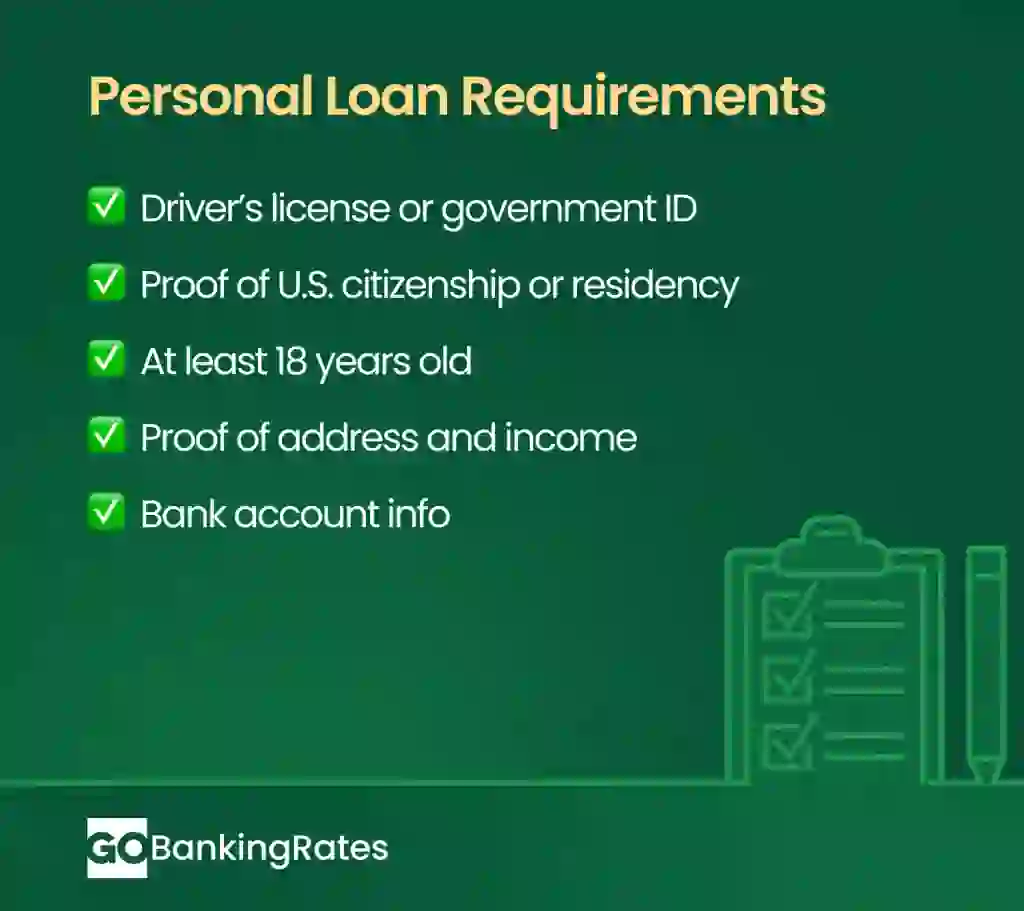Personal Loan Requirements: What You Need To Qualify in 2025

Commitment to Our Readers
GOBankingRates' editorial team is committed to bringing you unbiased reviews and information. We use data-driven methodologies to evaluate financial products and services - our reviews and ratings are not influenced by advertisers. You can read more about our editorial guidelines and our products and services review methodology.

20 Years
Helping You Live Richer

Reviewed
by Experts

Trusted by
Millions of Readers
If you’re looking to get a personal loan in 2025, gathering the items you need for your application ahead of time will make the process a lot smoother.

What Credit Score Do You Need for a Personal Loan?
Before you’re approved for a loan, a lender needs to evaluate how much of a lending risk you are. In other words, a lender wants some assurance that you will pay back the money you borrow — plus interest — on time without any issues.
Credit Score Requirements
To this end, most lenders have credit score requirements, as your credit score provides a snapshot of your overall financial health. A common minimum credit score for personal loans is 580, though some lenders require a score as high as 660.
Not only does having a good credit score help you get approved for a loan, but it can also get you the best interest rates. A high credit score of 720 or above is your best bet for securing the lowest interest rates, because it demonstrates to the lender that you have an established history of paying back borrowed money on time.
Consider Other Types of Personal Loans
If your credit score needs some work, you could still get approved for a personal loan, but you may need to consider other types of personal loans. For instance, there are secured loans. These loans require collateral, such as money in a savings account or an asset like your home or vehicle, to “secure” the money you’re borrowing.
Apply for a Loan With a Cosigner
Another option for getting a loan with bad credit is applying with a cosigner. Using a cosigner with a strong credit score can boost your application, because they’re agreeing to take on the responsibility of repaying the loan if you’re not able to.
Income and Debt-to-Income (DTI) Ratio
Beyond having a good credit score, you’ll need stable income to qualify for a personal loan. Minimum income requirements vary by lender, but you’ll generally need to prove that you have a stable source of income. Without this, lenders won’t have any assurance that you’ll be able to repay the funds you borrow.
Lenders will also look at your debt-to-income (DTI) ratio when reviewing your personal loan application. Your debt-to-income ratio is a percentage that reflects how much of your income goes toward paying off debt. A lower DTI indicates that you have a manageable amount of debt and are more likely to be able to repay a loan without any issues.
Other Ways To Borrow Money Without a Personal Loan
If you’re considering applying for a loan, you need to borrow money, but there are other options available, such as revolving lines of credit like credit cards and home equity lines of credit (HELOCs). Ask yourself if a loan is a better option based on your needs and credit score, and make sure you can afford the monthly payment before you finalize your decision.
Compare Interest Rates First
Could you forgo having to pay interest completely by utilizing a credit card with a 0% intro APR offer? You’d need to pay off your balance in full by the time the intro period ends, but if that’s doable, this could be a stronger option than taking out a personal loan, which will require paying interest.
Common Reasons for Denial and What To Do Next
Here are some common reasons you might get rejected for a personal loan and how you can troubleshoot them to apply again successfully.
| Problem or Reason for Rejection | Solution |
|---|---|
| Low credit | Check your credit report for errors, consider a cosigner or secured loan |
| High DTI | Pay down debt to lower your DTI |
| Unstable income | Consider a cosigner or secured loan, reapply after improving income |
| Application errors | Review the denial letter |
Is a Personal Loan the Right Choice for You?
Before applying for a personal loan, make sure it’s the best option for you. Make sure you know all the pros and cons of a personal loan so there are no surprises after you’ve already signed the paperwork.
FAQ About Personal Loan Requirements
Get the facts on personal loan requirements, along with answers to the most common questions people have.- What do you need to get a personal loan?
- You'll need to provide proof of ID, proof of income, proof of address, etc. to get a personal loan. Most lenders also have minimum credit score requirements.
- How to qualify for a personal loan with bad credit?
- If you have bad credit, you may need to get a secured loan or apply with a cosigner.
- Can I get a personal loan without a job?
- You generally need to demonstrate a solid source of income to get a personal loan, but you may be able to apply with a cosigner or to get a secured loan.
- What is the minimum credit score for a personal loan?
- Most personal loans have a minimum credit score requirement of 580 at the lowest.
Our in-house research team and on-site financial experts work together to create content that’s accurate, impartial, and up to date. We fact-check every single statistic, quote and fact using trusted primary resources to make sure the information we provide is correct. You can learn more about GOBankingRates’ processes and standards in our editorial policy.
- Consumer Financial Protection Bureau (CFPB). 2024. "Create a loan application packet."
- Citi. 2025. "What is a Personal Loan With a Cosigner?"
- CFPB. 2023. "What is a debt-to-income ratio?"
 Written by
Written by  Edited by
Edited by 





















